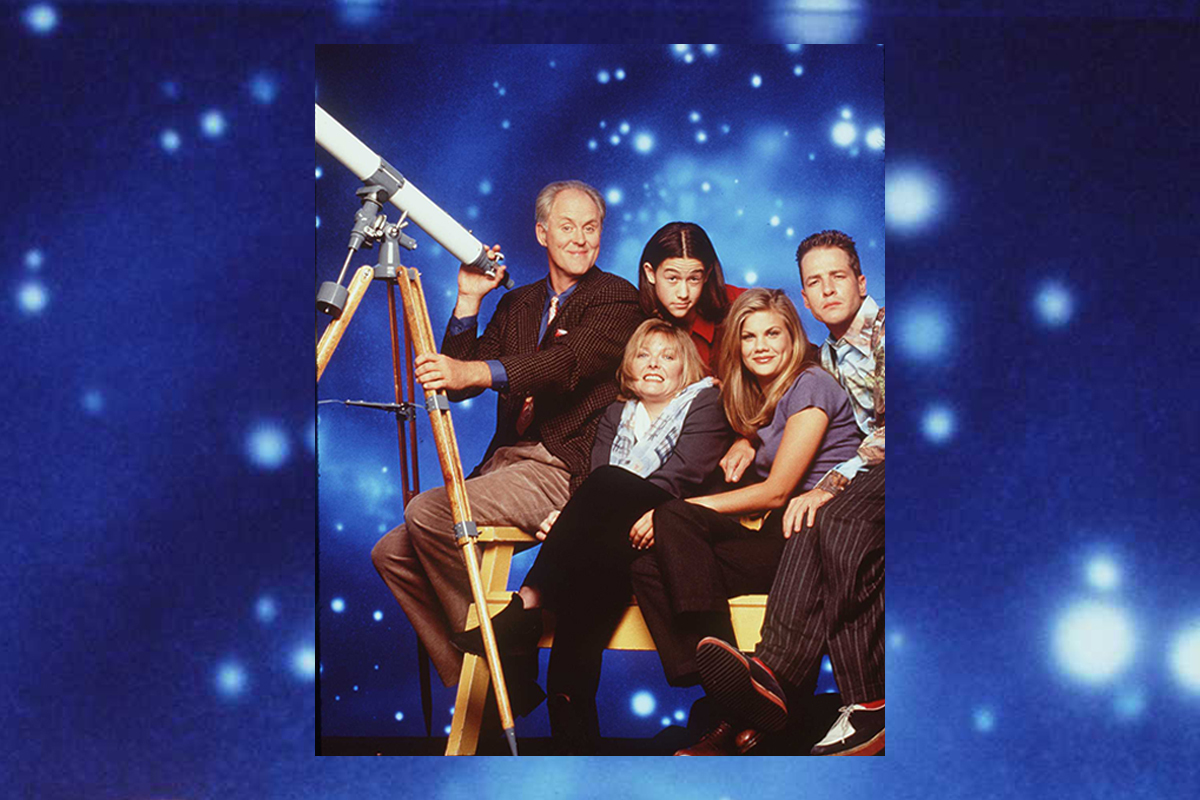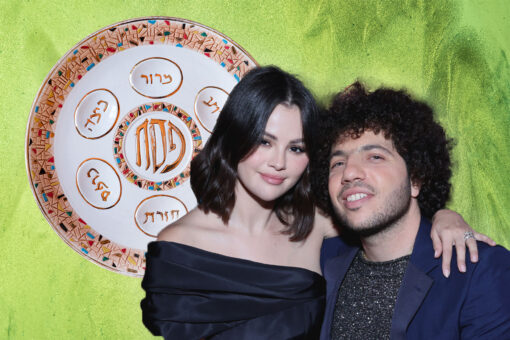The 1990s were a high point for the Jewish sitcom. “Seinfeld,” “Mad About You,” “The Nanny,” and the more obscure two-season series “Brooklyn Bridge” explored the challenges of intermarriage, the routines of Manhattan life, and the tensions between parents and children — all while giving Jewish stars a time to shine and Jewish writers the opportunity to write what they knew.
You wouldn’t typically lump “3rd Rock from the Sun” (NBC, 1996-2001) in with this bunch — in fact, the show might escape you entirely, since it’s only the second-most famous numbered rock in NBC’s TV pantheon. But in its heyday, “3rd Rock from the Sun” was a darling of the Television Academy, winning five awards at the 1997 Emmy Awards. These days, you can stream it on Peacock or watch it as part of the COZI network line-up. If the upwelling of nostalgia around their recent reunion at the Vulture Festival is any indication, this kooky sitcom will soon find a new audience and elicit new interpretations.
Here’s mine: “3rd Rock from the Sun” is the Crypto-Jewish sitcom of the Y2K generation, a show with as much to say about Jewish humor and storytelling as any from this decade. Dating back to the Spanish Inquisition, Crypto-Judaism refers to the historical phenomenon of Jews maintaining their rituals in secret while ostensibly converting or passing as gentiles to avoid persecution; since then, the term has come to signify any undercover or covert Jewishness. It might actually be more accurately to call “3rd Rock from the Sun” a reverse Crypto-Jewish sitcom: Instead of Jews posing as gentiles, the comedy centers on a group of extraterrestrial lifeforms trying to pass as — of all things — Jews.
In the pilot, four aliens arrive in central Ohio disguised as the typically atypical American family. The mission’s high-commander (John Lithgow) goes by “Dick,” the family patriarch and a college professor, while the information officer masquerades as “Tommy” (Joseph Gordon-Levitt), Dick’s teenage son; security officer “Sally” and radio transmitter “Harry” (Kristen Johnston and French Stewart) pose as Dick’s live-in siblings. Their goal? To infiltrate and study life on Earth. But midway through the show’s first season, in the episode “Dick Like Me,” they realize their failure to include a nationality in their backstory has aroused suspicion. Should they say they are Irish? Italian? Black? (The idea that a white person can simply choose her race and ethnicity is played for laughs — which, in our post-Rachel Dolezal, post-Hilaria Baldwin world, provides a stinging reminder that progress is not always a straight line.)
By episode’s end, their “Slavic mutt” of a landlady, Mrs. Dubcek (Elmarie Wendel), assumes that the last name “Solomon” marks them as Jewish. “Jewish…!” they cry in unison. “Chicks dig minorities!” young Tommy crows. “Mazel tov! I’m sorry, it just popped out,” Harry says. Instantly, the Solomons pick up the mannerisms and intonations of the stereotypical Ashkenazi American Jew as though it is second nature. The punchline of the episode comes when Dick asks Sally, of her new boyfriend, “So, is he Jewish?” Seemingly in response, the theme from “Fiddler on the Roof” begins to play.
The show’s remaining five seasons are shot through with Jewish references and callbacks, including that the aliens’ boss, referred to as the Big Giant Head, is played by semi-undercover Jew William “Captain Kirk” Shatner, and that the Solomons seem prepared to crash a bar mitzvah at the drop of a kippah. In the fourth season’s “Dick Solomon of the Indiana Solomons,” Dick and the gang attend a Solomon family reunion, insinuating themselves into this group of strangers that share their chosen surname. Harry, the family’s resident weirdo, befriends — and starts to imitate — Uncle Abe, a Jackie Mason/George Burns type with a love for gossip and cigars.
That’s not all. The Hebraic roots of “3rd Rock from the Sun” tap into a deeper, more robust Jewish tradition of storytelling and slapstick. Television historian Lynn Spigel has written about the “fantastic family sitcom” of the 1960s, which included “The Addams Family,” “The Munsters,” “Bewitched,” “My Favorite Martian” and others. These Cold War comedies look at monsters, witches, and genies trying to pass as human. Through the power of sitcom shenanigans, the Cold War threat of the Other is neutralized. But in their efforts to blend in, these outcast characters reveal the artificiality behind that aspirational postwar ideal: the wholesome, white-washed suburban family.
“3rd Rock from the Sun” is an homage to these sharp parables of assimilation at mid-century. As Arielle Kaplan wrote of the Jewishness of “The Addams Family” for Kveller: “While audiences were growing to love the quirky and spooky Addams family, Jews and Black Americans were moving into previously all-gentile and all-white neighborhoods. The TV show represented the social issue that ‘monsters’ were invading white territories.”
To that end, many of the creative minds behind these fantastic family sitcoms were Jewish, including “Addams Family” executive producer David Levy, “Munsters” co-producer Bob Mosher, “Bewitched” creator Sol Saks, and countless writers for these shows. And like the fantastic family sitcoms that came before, “3rd Rock from the Sun” reveals the human heart of this alien “family” and makes a campy, but genuine, plea for tolerance and equity.
Next to the relatable “show about nothing” of “Seinfeld” or the cute, lightly Jewish twenty-somethings of “Friends,” “3rd Rock from the Sun” stuck out. Like the Solomons, it was a sore thumb, a weird, high-concept throwback that barely assimilated into NBC’s primetime programming. In Season 5’s “Dick, Who’s Coming to Dinner,” Dick asks the family why they decided to inhabit white bodies for their mission. “Don’t you remember, Dick?” Tommy responds. “All the television signals that we picked up in outer space were filled with white people.” In this single line, “3rd Rock from the Sun” fixes its own Jew-ish outsider gaze on itself, demonstrating a savviness about racial representation lacking in both its 1960s precursors and its ‘90s sitcom contemporaries.
And this generic re-working of the fantastic family sitcom is not the show’s only marker of Jewishness. Season 2’s “Dick Jokes,” when the family examines the workings of human humor, is a veritable masterclass in Jewish comedy. “How am I supposed to know what’s funny?” Sally hollers at Dick, while unknowingly hitting Harry in the face with a 2×4. Later, Harry, Sally, and Tommy imitate the Three Stooges for Dick’s benefit: smacking each another, indulging in a lot of eye-poking, and delivering the signature whoop-whoop-whoop. And throughout the series, Dick’s love interest, the exceedingly patient Mary Albright (Jane Curtin), is every inch the Margaret Dumont to John Lithgow’s Groucho Marx, mocked and manhandled by a middle-aged scamp; in “Dick Jokes,” Dick ruthlessly roasts Mary at a university-wide dinner, finally proving to her that he is funny – and, also, a jerk.
Still, we can go further back into the tradition of Jewish storytelling – as far back, even, as the Torah – to parse the Jewish sensibility of the show. It is no small irony that the aliens have taken the last name “Solomon,” as they lack any of the wisdom or foresight of their namesake, the wise King Solomon. It is easy to imagine Dick or Sally arguing on behalf of cutting the baby in that famous story in half… before they come to know better.
Case in point: in Season 4’s “Feelin’ Albright,” Dick holds a campus fundraiser with the support and endorsement of Mary, who has recently been promoted to dean. Even though the event is a disaster, all of Dick’s colleagues praise him because they don’t want to offend the dean’s boyfriend. When Dick realizes he is receiving special treatment, he proudly trumpets: “I’m Dick Solomon, dammit, and I demand to be condemned for my failures! If any of you respect me as a person, you’ll stand up, come forward, and ridicule me for the idiot that I am!”
It is a silly formulation of a wise sentiment: that honesty is the cornerstone to respectful communication. Throughout the series, Solomons pratfall into profound truths about love, family, and community, kibbitzing about their discoveries as they sit on the roof of their attic apartment. (They never stop fearing fruit-filled Jello molds… then again, who doesn’t fear them?)
The Solomons may be behind the curve, but they learn fast. Who among us has mastered the difficulties in being human, and who else but Dick, Harry, Sally, and Tommy could do it in 30 minutes, including commercial breaks? Too bad that a reboot of the series — at least, with the original cast — is not looking likely, as our current world could use wisdom, however foolishly administered. But we are blessed to have the original in our midst and on our streaming devices. It turns out “3rd Rock from the Sun” is not just the Crypto-Jewish sitcom you never knew you needed — it’s not a bad playbook for becoming a mensch.
Late Take is a series on Alma where we revisit Jewish pop culture of the past for no reason, other than the fact that we can’t stop thinking about it?? If you have a pitch for this column, please e-mail submissions@heyalma.com with “Late Take” in the subject line.




